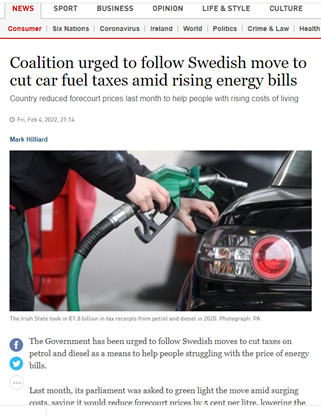The Government has been urged to follow Swedish moves to cut taxes on petrol and diesel as a means to help people struggling with the price of energy bills.
Last month, its parliament was asked to green light the move amid surging costs, saying it would reduce forecourt prices by 5 cent per litre, lowering the country’s tax take by about €225 million.
In 2020, the latest available data, the Irish State took in €1.8 billion in tax receipts from petrol and diesel. Over the last year, fuel price rises of a third were close to the highest ever recorded.

As the Government comes under increasing pressure to address rising living costs, the Irish Petrol Retailers Association (IPRA) said Ireland should consider to follow suit in cutting prices.
“We are seeing it [the effects of rising prices] on the forecourts with more drive-offs evident and consumers buying a specific amount of fuel rather than filling the tank,” said spokesman David Blevings.
“Unfortunately, retailers have no control over increasing global oil costs and must pass these increases on to consumers or face going out of business.”
The Government has already moved to help homeowners with escalating domestic energy bills. The Department of Finance did not respond to requests for comment on the possibility of reducing fuel tax.
Economic turnarounds
Forecourt prices rise in sync with crude oil which, the IPRA has noted, reached $85 (€74) per barrel for Brent crude last November, an increase of more than 50 per cent since last January.
Several causes are cited including a cutback in production from OPEC countries (Organisation of the Petroleum Exporting Countries) and Russia, at the same time as global economies undertake rapid economic turnarounds from the global Covid-19 pandemic.
Monthly data from the AA shows that in January, petrol in Ireland cost on average about 175.5 cent per litre, and diesel about 166.1 cent. However, those prices before tax were 77.912 and 81.134 cent respectively. As of January 31st the average price of oil per barrel was $87.58 (€76.45).
See the Article in the Irish Times HERE

